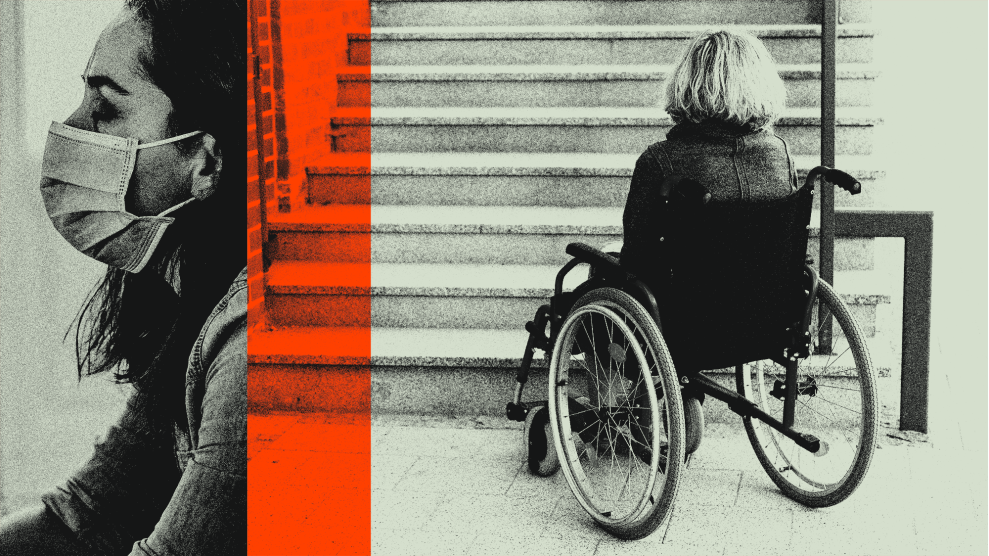
Mother Jones illustration; Getty(2)
Armond Dai has been living with Long Covid since his second infection, in September 2023. In December, his symptoms forced him to leave his job in architectural design; since March, he’s been on Medicaid.
Dai, who lives in California, is one of many chronically ill and disabled people who, under new Medicaid work requirements included in President Donald Trump’s July tax and spending bill, could be kicked off the program if he can’t work at least 80 hours a month. For Dai, that means finding a job that allows him to work remotely, later in the day, with flexible time for medical appointments.
“But do I have hope that that job will appear?” he asks. “I do not.”
Trump’s new work requirements, which fund extensive tax cuts for the wealthiest Americans and are set to enter force in by January 2027, present many problems for Medicaid users—including that they will likely require access to a doctor to successfully navigate. As I previously reported, Health and Human Services Secretary Robert F. Kennedy Jr. will also have the power to set their parameters, including which chronically ill and disabled people can qualify for exemptions.
But the new requirements are complicated even further by the Trump administration’s attacks on labor protections, particularly around disability. The White House has made it even harder for disabled and chronically ill people who want to work to find accessible jobs, especially as more companies roll back work-from-home policies, and as the job market craters amid tariffs and slow growth.
Dawn Morgan, who has multiple sclerosis and lives in the Washington, DC, area, has been on disability since her employer rejected her request to work partly from home prior to the Covid pandemic; she told me she didn’t expect to now be able to work 80 hours a month to remain on Medicaid.
“There are a number of us out here that still want to work,” Morgan said, but who face employers like her former one—whose blanket refusal meant she had “to give up everything,” including selling her home and car, “all because the employer was having a difficult time with reasonable accommodations.”
The Trump White House has mounted an all-out campaign against workplace accommodations, crusading against programs meant to include disabled workers, gutting worker protections and regulations, rolling back attempts to end the subminimum wage, and generally undermining its own drive to push disabled Americans into the workforce—all while supposedly planning to have Medicaid users replace deported agricultural workers.
The onslaught of ongoing Covid cases also makes it more difficult for immunocompromised people to find jobs that let them stay safe from infection—which can have successively worse effects and escalate the risk of Long Covid. Jill Zegers, in Nebraska, has chronic inflammatory demyelinating polyneuropathy, an autoimmune condition that forces her to take immunosuppressant drugs.
“All of my work history is public-facing,” said Zegers, who has been out of the workforce since 2017 and is on Medicaid. “So I’ve tried to get jobs that I could do from home. It’s not happening.”
Zegers had been in remission from her autoimmune disorder, although she has persistent symptoms like nerve damage in her hands. The possibility of being kicked off Medicaid because she can’t work 80 hours per month—despite seeking work and being willing to—scares her greatly.
“If I [fall] out of remission, I literally can’t walk, and it’s possible I could lose most function in my hands,” Zegers said.
Zegers already faced similar problems seeking Social Security disability payments, for which she has applied three times so far. The obstacles Zegers met with give a sense of how Medicaid work requirements may take shape.
“I’ve talked to people from the government,” Zegers said, “and they ask all those questions like, ‘Oh, can you stand for two hours?’” For many chronically ill people, the answer to such questions is yes, on a good day—but not every day. That, on its own, can be enough to lock applicants out; methods long used to disqualify people from federal programs are likely to crop up again as Kennedy’s HHS moves to kick as many people as possible off Medicaid.
To Dai, in California, slashing Medicaid rolls to fund high-income tax breaks is “ridiculous and cruel and deceitful,” shifting public health funds “straight into billionaires’ pockets”—some of whom, coincidentally, are leading the push to return-to-office.


















